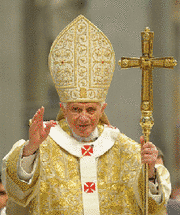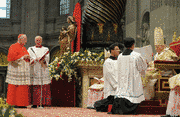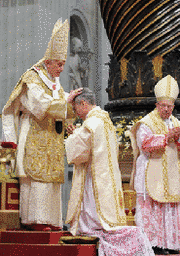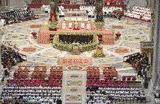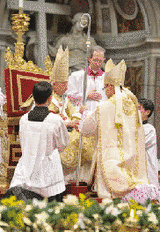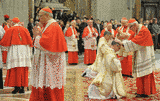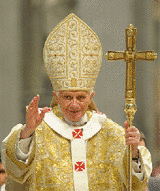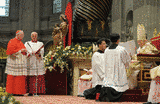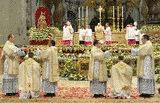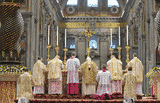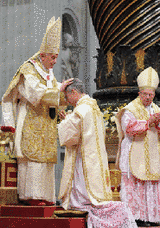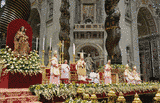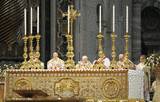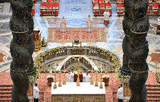Solemnity of the Epiphany of the Lord 2012
Pope Benedict XVI's Homily at Holy Mass
- in English, French, German, Italian, Polish, Portuguese & Spanish
"Dear Brothers and Sisters!
The Epiphany is a feast of light. “Arise, shine; for your light has come, and the glory of the Lord has risen upon you” (Is 60:1). With these words of the prophet Isaiah, the Church describes the content of the feast. He who is the true light, and by whom we too are made to be light, has indeed come into the world. He gives us the power to become children of God. The journey of the wise men from the East is, for the liturgy, just the beginning of a great procession that continues throughout history. With the Magi, humanity’s pilgrimage to Jesus Christ begins – to the God who was born in a stable, who died on the Cross and who, having risen from the dead, remains with us always, until the consummation of the world. The Church reads this account from Matthew’s Gospel alongside the vision of the prophet Isaiah that we heard in the first reading: the journey of these men is just the beginning. Before them came the shepherds – simple souls, who dwelt closer to the God who became a child, and could more easily “go over” to him (Lk 2:15) and recognize him as Lord. But now the wise of this world are also coming. Great and small, kings and slaves, men of all cultures and all peoples are coming. The men from the East are the first, followed by many more throughout the centuries. After the great vision of Isaiah, the reading from the Letter to the Ephesians expresses the same idea in sober and simple terms: the Gentiles share the same heritage. Psalm 2 puts it like this: “I shall bequeath you the nations, put the ends of the earth in your possession.”
The wise men from the East lead the way. They open up the path of the Gentiles to Christ. During this holy Mass, I will ordain two priests to the episcopate, I will consecrate them as shepherds of God’s people. According to the words of Jesus, part of a shepherd’s task is to go ahead of the flock. So, allowing for all the differences in vocation and mission, we may well look to these figures, the first Gentiles to find the pathway to Christ, for indications concerning the task of bishops. What kind of people were they? The experts tell us that they belonged to the great astronomical tradition that had developed in Mesopotamia over the centuries and continued to flourish. But this information of itself is not enough. No doubt there were many astronomers in ancient Babylon, but only these few set off to follow the star that they recognized as the star of the promise, pointing them along the path towards the true King and Saviour. They were, as we might say, men of science, but not simply in the sense that they were searching for a wide range of knowledge: they wanted something more. They wanted to understand what being human is all about. They had doubtless heard of the prophecy of the Gentile prophet Balaam: “A star shall come forth out of Jacob and a sceptre shall rise out of Israel” (Num 24:17). They explored this promise. They were men with restless hearts, not satisfied with the superficial and the ordinary. They were men in search of the promise, in search of God. And they were watchful men, capable of reading God’s signs, his soft and penetrating language. But they were also courageous, yet humble: we can imagine them having to endure a certain amount of mockery for setting off to find the King of the Jews, at the cost of so much effort. For them it mattered little what this or that person, what even influential and clever people thought and said about them. For them it was a question of truth itself, not human opinion. Hence they took upon themselves the sacrifices and the effort of a long and uncertain journey. Their humble courage was what enabled them to bend down before the child of poor people and to recognize in him the promised King, the one they had set out, on both their outward and their inward journey, to seek and to know.
Dear friends, how can we fail to recognize in all this certain essential elements of episcopal ministry? The bishop too must be a man of restless heart, not satisfied with the ordinary things of this world, but inwardly driven by his heart’s unrest to draw ever closer to God, to seek his face, to recognize him more and more, to be able to love him more and more. The bishop too must be a man of watchful heart, who recognizes the gentle language of God and understands how to distinguish truth from mere appearance. The bishop too must be filled with the courage of humility, not asking what prevailing opinion says about him, but following the criterion of God’s truth and taking his stand accordingly – “opportune – importune”. He must be able to go ahead and mark out the path. He must go ahead, in the footsteps of him who went ahead of us all because he is the true shepherd, the true star of the promise: Jesus Christ. And he must have the humility to bend down before the God who made himself so tangible and so simple that he contradicts our foolish pride in its reluctance to see God so close and so small. He must devote his life to adoration of the incarnate Son of God, which constantly points him towards the path.
The liturgy of episcopal ordination interprets the essential features of this ministry in 8 questions addressed to the candidates, each beginning with the word “Vultis? – Do you want?” These questions direct the will and mark out the path to be followed. Here I shall briefly cite just a few of the most important words of this presentation, where we find explicit mention of the elements we have just considered in connection with the wise men of today’s feast. The bishops’ task is praedicare Evangelium Christi, it is custodire et dirigere, it is pauperibus se misericordes praebere, it is indesinenter orare. Preaching the Gospel of Jesus Christ, going ahead and leading, guarding the sacred heritage of our faith, showing mercy and charity to the needy and the poor, thus mirroring God’s merciful love for us, and finally, praying without ceasing: these are the fundamental features of the episcopal ministry. Praying without ceasing means: never losing contact with God, letting ourselves be constantly touched by him in the depths of our hearts and, in this way, being penetrated by his light. Only someone who actually knows God can lead others to God. Only someone who leads people to God leads them along the path of life.
The restless heart of which we spoke earlier, echoing St Augustine, is the heart that is ultimately satisfied with nothing less than God, and in this way becomes a loving heart. Our heart is restless for God and remains so, even if every effort is made today, by means of most effective anaesthetizing methods, to deliver people from this unrest. But not only are we restless for God: God’s heart is restless for us. God is waiting for us. He is looking for us. He knows no rest either, until he finds us. God’s heart is restless, and that is why he set out on the path towards us – to Bethlehem, to Calvary, from Jerusalem to Galilee and on to the very ends of the earth. God is restless for us, he looks out for people willing to “catch” his unrest, his passion for us, people who carry within them the searching of their own hearts and at the same time open themselves to be touched by God’s search for us. Dear friends, this was the task of the Apostles: to receive God’s unrest for man and then to bring God himself to man. And this is your task as successors of the Apostles: let yourselves be touched by God’s unrest, so that God’s longing for man may be fulfilled.
The wise men followed the star. Through the language of creation, they discovered the God of history. To be sure – the language of creation alone is not enough. Only God’s word, which we encounter in sacred Scripture, was able to mark out their path definitively. Creation and Scripture, reason and faith, must come together, so as to lead us forward to the living God. There has been much discussion over what kind of star it was that the wise men were following. Some suggest a planetary constellation, or a supernova, that is to say one of those stars that is initially quite weak, in which an inner explosion releases a brilliant light for a certain time, or a comet, etc. This debate we may leave to the experts. The great star, the true supernova that leads us on, is Christ himself. He is as it were the explosion of God’s love, which causes the great white light of his heart to shine upon the world. And we may add: the wise men from the East, who feature in today’s Gospel, like all the saints, have themselves gradually become constellations of God that mark out the path. In all these people, being touched by God’s word has, as it were, released an explosion of light, through which God’s radiance shines upon our world and shows us the path. The saints are stars of God, by whom we let ourselves be led to him for whom our whole being longs. Dear friends: you followed the star Jesus Christ when you said “yes” to the priesthood and to the episcopacy. And no doubt smaller stars have enlightened and helped you not to lose your way. In the litany of saints we call upon all these stars of God, that they may continue to shine upon you and show you the path. As you are ordained bishops, you too are called to be stars of God for men, leading them along the path towards the true light, towards Christ. So let us pray to all the saints at this hour, asking them that you may always live up to this mission you have received, to show God’s light to mankind."
Papa Benedetto's words at the Angelus in St Peter's Square
- in English, French, German, Italian, Portuguese & Spanish
"Dear Brothers and Sisters,
Today, the Solemnity of the Epiphany of the Lord, I have ordained two new bishops in St Peter’s Basilica, so please forgive the delay. This Feast of the Epiphany is a very ancient Feast whose origins date back to the Christian East and which highlights the mystery of the manifestation of Jesus Christ to all peoples, represented by the Magi who came to worship the King of the Jews just born in Bethlehem, as St Matthew’s Gospel recounts. This “new light” that was lit on Christmas night is beginning to shine on the world today, as the image of the star suggests, a heavenly portent that attracted the attention of the Magi and guided them on their journey to Judea.
The entire season of Christmas and Epiphany is marked by the theme of light. In the northern hemisphere this is also linked to the fact that after the winter solstice the days begin to lengthen in comparison with the nights. However, Christ’s word applies for all peoples, over and above their geographical location: “I am the light of the world; he who follows me will not walk in darkness, but will have the light of life” (Jn 8:12). Jesus is the sun that appeared on humanity’s horizon to illumine the personal existence of every one of us and to guide us all together toward the destination of our pilgrimage, toward the land of freedom and peace in which we shall live for ever in full communion with God and with each other.
Christ entrusted the proclamation of this mystery of salvation to his Church. St Paul writes: “It has now been revealed to his holy apostles and prophets by the Spirit; that is, how the Gentiles are fellow heirs, members of the same body, and partakers of the promise in Christ Jesus through the Gospel” (Eph 3:5-6). The invitation that the Prophet Isaiah addressed to the Holy City Jerusalem may be applied to the Church: “Arise, shine; for your light has come, and the glory of the Lord has risen upon you. For behold, darkness shall cover the earth, and thick darkness the peoples; but the Lord will arise upon you, and his glory will be seen upon you” (Is 60:1-2). And so it is, as the Prophet tells us: the world, with all its resources is unable to give humanity the light to guide it on its journey. We find this in our day too: the western civilization seems to have lost its bearings and is navigating by sight. Nevertheless the Church, thanks to the Word of God, sees through the fog. She has no technical solutions but keeps her gaze fixed on the destination and offers the light of the Gospel to all people of good will, whatever their nation and culture. And this is also the mission of Papal Representatives to States and to International Organizations.
This very morning, as I said, I have had the joy of conferring episcopal Ordination upon two new Apostolic Nuncios. Let us entrust to the Virgin Mary their service and the evangelizing task of the whole Church.
And now, with great joy, I announce that a Consistory will be held next 18 February at which I shall appoint 22 new members of the College of Cardinals.
As is well known, the task of Cardinals is to help the Successor of Peter to carry out his ministry of strengthening the brethren in the faith and of being a principle and source of the unity and communion of the Church.
Here are the names of the new Cardinals:
1. Archbishop Fernando Filoni, Prefect of the Congregation for the Evangelization of Peoples;
2. Archbishop Manuel Monteiro de Castro, Major Penitentiary;
3. Archbishop Santos Abril y Castelló, Archpriest of the Papal Basilica of St Mary Major;
4. Archbishop Antonio Maria Vegliò, President of the Pontifical Council for the Pastoral Care of Migrants and Itinerant People;
5. Archbishop Giuseppe Bertello, President of the Pontifical Commission for Vatican City State and President of the Governorate of the same State;
6. Archbishop Francesco Coccopalmerio, President of the Pontifical Council for Legislative Texts;
7. Archbishop João Braz de Aviz, Prefect of the Congregation for Institutes of Consecrated Life and Societies of Apostolic Life;
8. Archbishop Edwin Frederick O’Brien, Pro-Grand Master of the Equestrian Order of the Knights of the Holy Sepulchre of Jerusalem;
9. Archbishop Domenico Calcagno, President of the Administration of the Patrimony of the Apostolic See;
10. Archbishop Giuseppe Versaldi, President of the Prefecture for the Economic Affairs of the Holy See;
11. H.B. George Alencherry, Major Archbishop of Ernakulam — Angamaly for Syro-Malabars, India;
12. Archbishop Thomas Christopher Collins of Toronto, Canada;
13. Archbishop Dominik Duka, O.P., of Prague, Czech Republic;
14. Archbishop Willem Jacobus Eijk of Utrecht, The Netherlands;
15. Archbishop Giuseppe Betori of Florence, Italy;
16. Archbishop Timothy Michael Dolan of New York, United States of America;
17. Archbishop Rainer Maria Woelki of Berlin, Federal Republic of Germany;
18. Bishop John Tong Hon of Hong Kong, People’s Republic of China;
In addition, I have decided to raise to the dignity of cardinal a venerable prelate who is carrying out his ministry as the pastor and father of a Church, and three praiseworthy clerics who have distinguished themselves for their commitment at the service of the Church:
1. H.B. Lucian Mureşan, Major Archbishop of Făgăraş and Alba Iulia for Romanians, Romania;
2. Mons. Julien Ries, Priest of the Diocese of Namur, Belgium, Professor emeritus of history and religion at the Catholic University of Leuven/Louvain;
3. Fr Prosper Grech, OSA, Lecturer emeritus at various universities in Rome and Consultor to the Congregation for the Doctrine of the Faith;
4. Fr Karl Becker, SJ, Lecturer emeritus at the Pontifical Gregorian University, Consultor to the Congregation for the Doctrine of the Faith.
The new Cardinals come from various parts of the world, as you have heard, and carry out various ministries at the service of the Holy See or in direct contact with the faithful as fathers and pastors of particular Churches.
I would like to invite you all to pray for the newly appointed Cardinals, asking for the intercession of the Blessed Virgin Mary, Mother of the Church, so that they may always be able to witness with courage and determination to their love for Christ and for his Church."
BXVI - Friday, 6 January 2012 - © Copyright 2012 - Libreria Editrice Vaticana

